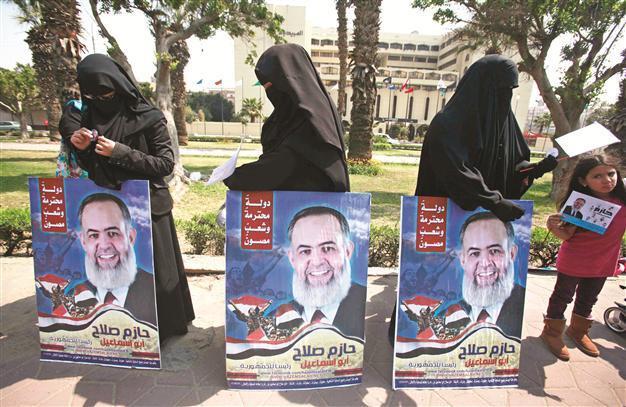Brotherhood giving mixed signals
CAIRO

Supporters of Hazem Salah Abu Ismail, a Salafi leader and presidential candidate, carry his posters before his arrival to present recommendation documents to the Higher Presidential Elections Commission. Al-Shater also presented his candidacy documents yesterday. REUTERS photo
The Muslim Brotherhood’s candidate for Egypt’s presidency has declared that introducing Shariah will be his “first and final” objective if he wins elections in May and June despite the group’s efforts to persuade Washington that it is committed to democracy. Making his first reported statements since the Brotherhood’s surprise decision to field him in the elections, Khayrat al-Shater also promised to reform the Interior Ministry, which long played a leading role in suppressing dissent.
“Shariah was and will always be my first and final project and objective,” al-Shater was quoted on April 4 as telling a meeting of the Religious Association for Rights and Reform, along with figures who belong to the hard-line Salafi school of Islam. The association said in a posting on its Facebook page that al-Shater promised that, if elected, he would form a council of clerics to review legislation to ensure it adheres to Islamic Shariah law. Al-Shater was set to present his candidacy documents yesterday for the May 23 to 24 presidential vote. There are multiple candidates running on an Islamic agenda, dividing the vote and raising a possible window of victory for a non-Islamist figure. Al-Shater faces tough competition from a lawyer-turned-TV preacher, Hazem Abu Ismail, who is the favorite of Salafis. After al-Shater announced his candidacy, Abu Ismail rejected pressure to quit the race and many prominent Salafis announced they were sticking with him.
Panel on track
In Washington, a delegation from the Freedom and Justice Party (FJP), the political wing of the Muslim Brotherhood, sought to dismiss fears that this meant they aimed to establish an Islamic theocracy. White House spokesman Jay Carney said the Egyptian delegation had met with “low-level” officials at the National Security Council and that they were also expected to meet officials at the State Department.
“We emphasize the importance of respect for minority rights, the full inclusion of women and our regional security concerns,” said National Security Council spokesman Tommy Vietor. Abdul Mawgoud Dardery, an FJP lawmaker, said at a forum at Georgetown University that the party was dedicated to the principle of a “civil state” and the objectives of Shariah law rather than its specific practice. The group said the FJP was a moderate force that could strike a balance between secular activists and more hard-line Islamist groups. “The Freedom and Justice Party is taking the middle ground,” said Dardery.
Meanwhile, Egypt’s constitutional assembly said the committee will forge ahead with its work despite appeals from liberals, Christians and others who walked out in protest against the Islamist domination of the panel. “This is a committee that was formed and elected to work,” said Saad el-Katatni, the head of the panel. “We won’t hold up its work, and we will continue our path.”
Compiled from Reuters and AP stories by the Daily News.
